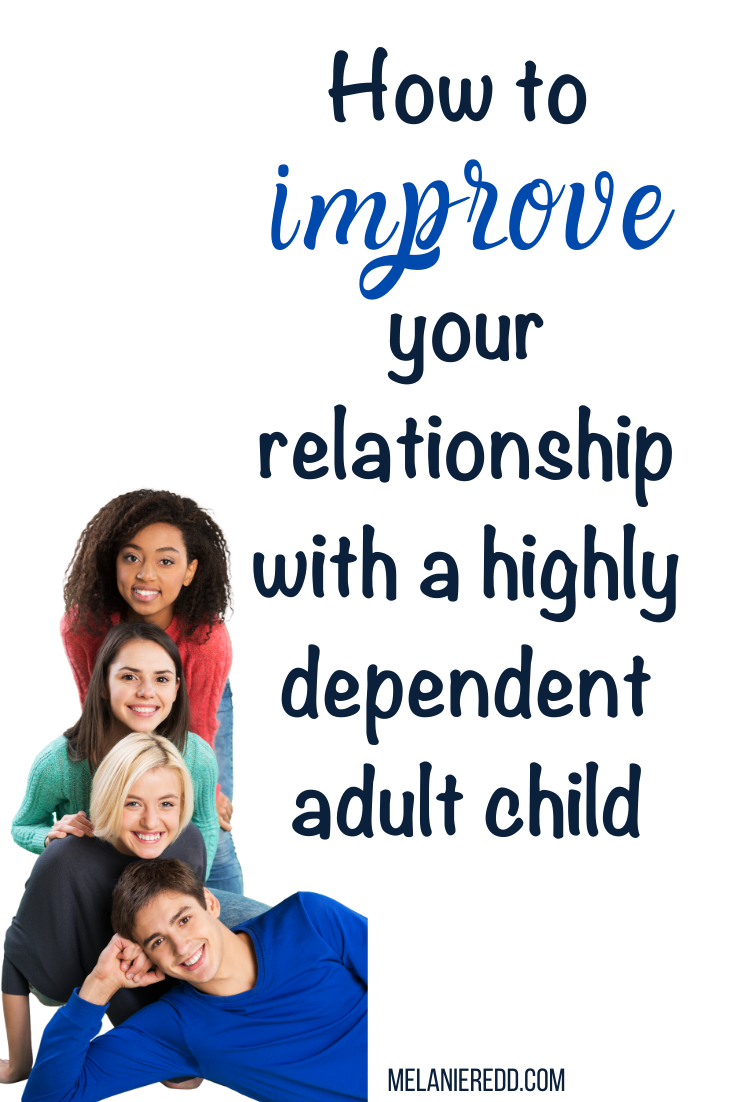“You are the bows from which your children as living arrows are sent forth.” —On Children, from The Prophet, about being a parent, by Khalil Gibran
Every parent-child relationship has its own unique personality.
Parents of a highly dependent adult child, however, find this uniqueness difficult to appreciate.
The Gibran quote at the top (while timelessly beautiful) perplexes these parents.
They’ve been trying to “launch” their “living arrow” for years but to no avail.
Truly, their child might be 22, 32, or 42 (or older) by now—and never soared very high or got very far.
They’ve been trying to “launch” their “living arrow” for years but to no avail. Their child might be 22, 32, or 42 (or older) by now—and never soared very high or got very far. Click To Tweet

How to improve your relationship with a highly dependent adult child
Many of these moms and dads embrace a similar ideal as the poet.
All their work has not yielded “the thing” that will get their child to launch.
“The thing” could be a school, a job, a friend, a therapist, a new hobby, a bible study. It might be paying off their child’s debt, starting them in business, waking them up in the morning, doing their grocery shopping.
Unfortunately, these repeated attempts only renew and reinforce the child’s dependency—and their own.
This is sometimes referred to as codependency, but that term can feel bristly because it has come to imply something “sick.”
I like to think of it more as a way to describe patterns of behaviors that don’t serve the growth and individuality of two people.
Patterns in relationships are the equivalent of accumulated data in a science experiment: they yield clues.
Here we are talking about clues that point to enabling.
Keep in mind, there is nothing wrong with doing something nice for your kid.
What about trying to expand the view of what “nice” is?
For example, a different kind of something nice could be offering a smile; a word of encouragement (as in “great job!”); asking what they think they should do about a problem they are facing.
Enabling happens when parents perpetually do things their children can do for themselves.
Enabling happens when parents perpetually do things their children can do for themselves. Click To Tweet
How it Begins
It typically begins when the parent senses discomfort within themselves at having to watch their child struggle or not do something the way the parents think it is supposed to be done. (Again, we are talking about patterns here.)
Enabling (and lots of worries) can happen when there is an addiction in the family and mental health issues; these are valid concerns.
However, the enabling behavior by the parents, and the constant focus on the child, don’t address the real problems anyway.
(In this regard, the “real” problems are the parent’s difficulty in focusing on themselves and the child’s addiction that needs care the parents cannot give.)
Enabling keeps people small.
No one gets to express their true self. One way to begin to step back from enabling is to spend some time giving attention to oneself.
Here is a meditation that can help parents cultivate curiosity and wonder about why they might be enabling their adult child…
Notice, be curious and try to be patient with yourself.
Curating curiosity
Curiosity is my new go-to as I explore my motives behind interactions with my child.
With curiosity and wonder, I begin to explore why I did what I did. I do this with objectivity. And, I do this without self-blame.
I dig deeper and wait for answers to emerge.
I ask myself questions I may not want to know the answer to. However, doing so will eventually help quell the perceived shame I feel or fear.
This happens by exposing myself to things about myself I thought. And, I didn’t want to know.
Further, I will find, as I sit with what I learn about myself, that my shame begins to dissipate because I will begin to understand why I did what I did.
This will help me see, at a deeper level, why it did not work.
Curiosity is my new go-to as I explore my motives behind interactions with my child. Click To Tweet
What’s wrong with me?
I needn’t go fishing for things “wrong” with me—trying too hard to find the reasons in order to “fix” myself.
Trying too hard to find the exact reason I acted a certain way will lead me into a stagnant loop of listing every single thing I did wrong versus excavating information I can use to learn something valuable about myself.
I already know not to repeat the behavior that doesn’t work.
What does work?
And if I don’t yet know exactly what the behaviors are, or what triggers me to do them, that’s okay; I’m here to learn.
There is no reason to berate myself for the things I did.
However, becoming curious will make it less uncomfortable to examine what I did and turn off my autopilot reactions.
Indeed, curiosity helps neutralize my feelings and lets me see more facets of the situation—and myself.
Today I practice curiosity instead of self-blame.
*From Stop Counting the Hours: 50 Days of Recovery, Hope, and Change: A Book for Parents of Overly Dependent Adult Children
About the Author
Meredith Resnick is an LCSW and former therapist. Her writing has appeared in the Washington Post, JAMA, and many others. All the Love We Need to Talk About—Breaking the silence to find solace and meaning after pregnancy loss, for which she is a coauthor, will be published by Turner in 2021.
In addition, she has a popular ebook series about narcissism and recently wrote about the topic of highly dependent adult children for PsychologyToday.com.
Were you blessed by what you read?
Then, would you share this article with a friend, co-worker, or family member?
Or, maybe you can send it to a friend or family member?
This blog occasionally uses affiliate links and may contain affiliate links. Additionally, Melanie Redd is a participant in the Amazon Services LLC Associates Program, an affiliate advertising program designed to provide a means for sites to earn advertising fees by advertising and linking to amazon.com. Also, for more on my disclosure policy, click HERE.
© Melanie Redd and Ministry of Hope, 2020. Unauthorized use and/or duplication of this material without express and written permission from this blog’s author and/or owner is strictly prohibited. Further, excerpts and links may be used, provided that full and clear credit is given to Melanie Redd and Ministry of Hope with appropriate and specific direction to the original content.



0 Comments